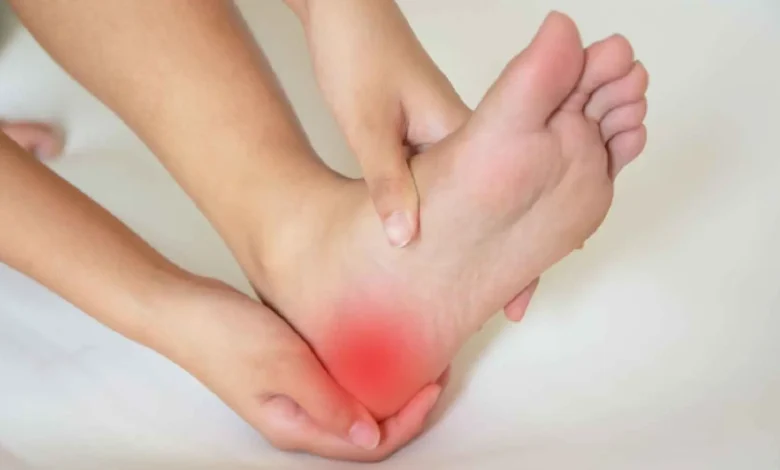Understanding Heel Cancer Symptoms: What You Need to Know

Heel cancer symptoms can be tricky to recognize because they might seem like everyday foot problems. But it’s important to pay attention to any unusual changes in your heels. Cancer in the heel can sometimes show signs like persistent pain, swelling that doesn’t go away, or even changes in the skin and nails around your heel. If you notice any of these signs, it’s essential to talk to a doctor right away. Early detection can make a big difference in treatment!
Understanding Heel Cancer: Signs and Symptoms
Heel cancer can be hard to spot because it starts quietly. It often begins with heel pain that doesn’t go away, no matter what you do. You might notice your heel swelling up, feeling tender to the touch. Sometimes, the skin around your heel might change color or feel thicker than usual. These signs are crucial clues that something might be wrong with your heel.
Recognizing Signs of Cancer in the Heel
When you have heel cancer, your body might give you hints that something isn’t right. Pay attention if your heel hurts all the time, especially when you walk or stand. Look for changes in how your heel looks, like redness or warmth that doesn’t seem to fade. Sometimes, you might feel a lump or a thickening of the skin on your heel. These signs can tell you it’s time to talk to a doctor.
What Heel Cancer Symptoms Feel Like
Imagine your heel hurting more than it should, even when you’re not using it much. You might feel it throbbing or even shooting pain up your leg. Sometimes, your heel might feel stiff, making it hard to move around comfortably. If you’re feeling any of these strange sensations in your heel, it’s worth checking with a healthcare expert.

Getting Help for Heel Cancer
When you think you might have heel cancer, don’t wait. Tell a grown-up you trust, like your parents or a teacher, so they can help you see a doctor. The doctor will ask questions and might do some tests to find out what’s causing your heel problems. Remember, it’s important to get help early to stop any bad things from happening.
Learning About Treatment for Heel Cancer
Treating heel cancer usually involves special doctors who know a lot about feet and cancers. They might suggest surgery to remove the bad parts or medicine to make the cancer go away. Sometimes, you might need to take breaks from playing to let your heel heal properly. Doctors and nurses will help you feel better, so don’t worry too much!
Supporting Someone with Heel Cancer
If someone you know has heel cancer, they might feel scared or worried. It’s essential to be kind and helpful to them. You can make cards or drawings to cheer them up or spend time talking with them. Just being there can make a big difference!
Preventing Heel Problems in the Future
To keep your heels healthy, wear shoes that fit well and support your feet. Avoid wearing shoes that are too tight or too loose. Also, try not to play rough games that could hurt your heels. Taking good care of your feet now will help you stay healthy and strong!
Stories of People with Heel Cancer
Hearing about other kids who have had heel cancer and got better can be inspiring. They might share how they felt and what helped them during their treatment. These stories show that even though heel cancer is scary, many kids get better with the right help and support.
1. Why Regular Check-ups are Important
Regular check-ups with the doctor can catch heel cancer early. They can check your heel to make sure everything is okay. It’s like going to the doctor for a check-up on your body’s health.
How to Talk to Your Parents About Heel Pain
If your heel hurts a lot and won’t go away, talk to your parents. Tell them about the pain and show them where it hurts. They can help you go to the doctor to find out what’s wrong.

When to See a Foot Specialist
A foot specialist is a doctor who knows a lot about feet. If you have heel pain that doesn’t get better, they can help figure out if it’s something serious like heel cancer. They’re experts in making feet feel better!
Tips for Taking Care of Your Heels Every Day
Taking care of your heels means wearing comfy shoes that fit well. Avoid running too much or jumping too hard. Your heels will thank you for taking care of them!
Fun Activities You Can Still Do with Heel Pain
Even if your heel hurts, there are still fun things you can do. You can read books, draw pictures, or play quiet games with friends. Resting your heel helps it heal faster.
Understanding Heel Cancer Symptoms
Heel cancer symptoms can be quite surprising and often mistaken for other foot problems. One of the first signs might be a persistent pain in your heel that doesn’t go away with rest. This pain can feel like a deep ache or sometimes a sharp, stabbing sensation. You might also notice swelling or a lump in your heel area. The skin over the heel might change color or become thicker. If you have any of these symptoms, it’s important to see a doctor to find out what’s causing them.
Another symptom of heel cancer is difficulty walking. Because the heel is crucial for balance and movement, any problem there can make walking painful or hard. Some people might start limping or feel like they need to rest their foot more often. In more serious cases, heel cancer can cause numbness or a tingling feeling in the foot. These symptoms happen because the tumor might press on nerves. If you experience any unusual changes in your heel, it’s always best to get it checked out by a healthcare professional.
What is Heel Cancer?
Heel cancer is a rare condition where abnormal cells grow in the heel bone or surrounding tissues. These cells can cause pain and changes in how the heel feels or looks. While heel pain can happen for many reasons, heel cancer symptoms are different because they don’t go away with rest or normal treatments like comfy shoes.
Signs to Watch Out For
If you have heel cancer, you might notice swelling around your heel that doesn’t get better with ice or rest. The skin on your heel might also change, becoming red, warm, or even forming lumps or bumps that feel hard. Sometimes, heel cancer can make it hard to walk or put weight on your foot because of the pain.
Pain That Doesn’t Go Away
One of the main signs of heel cancer is pain that sticks around for a long time. This pain can get worse over weeks or months, even if you try to rest your foot. It might feel like a deep ache in your heel that doesn’t go away, no matter what you do. If you notice this kind of pain in your heel, it’s essential to tell a grown-up so they can help you see a doctor.
Changes in Your Heel’s Shape
As heel cancer grows, it can change how your heel looks. You might notice that your heel feels bigger or looks swollen compared to your other foot. Sometimes, there can be bumps or lumps that you can feel when you touch your heel. These changes are important to notice because they can help doctors figure out what’s causing the problem and how to fix it.

When to Talk to a Doctor
If you or someone you know has heel pain that doesn’t go away, especially if it’s getting worse or causing other changes like swelling or lumps, it’s time to talk to a doctor. They can check your heel and see if there’s something serious going on, like heel cancer. Remember, it’s okay to ask questions and tell a grown-up about any worries you have. Taking care of your heels and your whole body is important for staying healthy and happy.
conclusion
Now you know a lot about heel cancer symptoms! Remember, if your heel hurts for a long time and doesn’t get better with rest or comfy shoes, it’s important to talk to a grown-up. They can help you go to the doctor who knows all about feet. Doctors can check to see if it’s just a small problem or something more serious.
Taking care of your heels every day by wearing good shoes and being gentle when you play can help keep them healthy. And if you ever have questions or worries about your heels or any part of your body, don’t be afraid to ask. Learning about your body and how to take care of it is super important, and grown-ups are there to help you stay happy and healthy!



